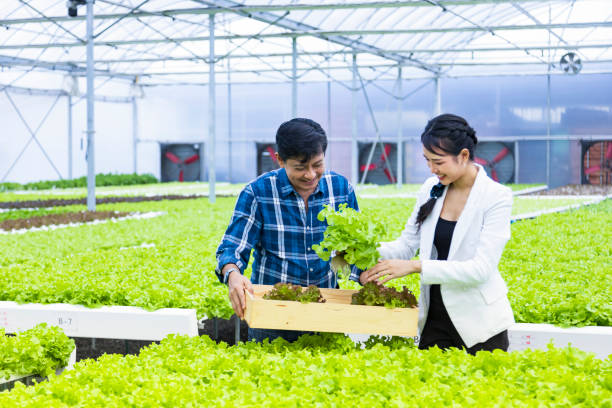Urban agriculture is gaining ground in cities across the globe, and Dubai is no exception. With limited arable land and a hot desert climate, the city is turning to innovative farming techniques to meet growing food demands. Among these, hydroponic farming stands out as a sustainable and space-efficient solution. Behind many successful hydroponic projects are specialized professionals—hydroponic farming consultants. These experts are playing a critical role in shaping the future of urban agriculture in Dubai.
What Is Hydroponic Farming?
Hydroponic farming is a method of growing plants without soil. Instead, plants are cultivated in a nutrient-rich water solution. This method allows for controlled environments, reduced water usage, and increased crop yield, especially in arid regions like Dubai.
How Hydroponics Differs from Traditional Farming
Unlike conventional farming, hydroponic systems do not rely on natural soil fertility. Plants get their nutrients directly from the water solution. This results in faster growth cycles, fewer pests, and greater control over plant health.
Types of Hydroponic Systems Used in Urban Areas
Common systems include deep water culture, nutrient film technique, aeroponics, and vertical farming setups. Each system has its own benefits and is chosen based on the space available and the types of crops being cultivated.
Why Dubai Is Turning to Hydroponic Farming
Dubai faces unique agricultural challenges due to its geography and climate. Hydroponics offers a promising solution to these constraints.
Climate and Environmental Factors
With high temperatures, limited rainfall, and sandy soil, traditional farming is difficult in Dubai. Hydroponic systems can be installed indoors or in greenhouses, offering year-round cultivation regardless of the weather.
Water Conservation and Sustainability
Hydroponic farming uses up to 90% less water than traditional methods. Given Dubai’s dependence on desalinated water, this efficiency is a major advantage.
Food Security and Local Production
As Dubai aims to increase its local food production, hydroponics offers a practical way to reduce reliance on imports and shorten the supply chain. Locally grown crops can reach consumers faster and fresher.
The Role of Hydroponic Farming Consultants
Hydroponic consultants bring technical expertise and strategic planning to every project. They guide businesses, individuals, and institutions through every stage of hydroponic development.
Initial Planning and Feasibility Analysis
Before launching a hydroponic system, consultants assess location, space, budget, and objectives. They perform feasibility studies to determine the best setup for long-term sustainability and profitability.
System Design and Customization
Hydroponic systems are not one-size-fits-all. Consultants tailor the design based on the client’s needs, whether it’s for leafy greens, herbs, or vine crops. They select the right system, lighting, and nutrient delivery mechanisms.
Installation and Technical Support
Once the plan is in place, consultants oversee the installation of the system. They ensure that components are set up correctly and meet quality standards. Many also provide technical training to staff or operators.
Ongoing Monitoring and Optimization
Consultants don’t stop at installation. They monitor system performance, provide solutions to emerging problems, and fine-tune growing conditions. This ongoing support is key to consistent yields and operational efficiency.
Skills and Expertise of Hydroponic Consultants
The job of a hydroponic consultant combines science, engineering, and practical farming knowledge. Their expertise is crucial for success in this high-tech approach to agriculture.
Agronomy and Plant Science
Understanding plant nutrition, growth cycles, and pest management is vital. Consultants use this knowledge to select appropriate crops and fine-tune nutrient solutions.
Environmental Control and System Engineering
Modern hydroponic setups rely on precise control of temperature, humidity, light, and water quality. Consultants are trained to design and manage these controlled environments.
Data Analysis and Problem-Solving
Hydroponic systems generate a lot of data. Consultants analyze this data to identify inefficiencies, diagnose plant health issues, and improve overall productivity.
Benefits of Hiring Hydroponic Consultants in Dubai
In a city with high land costs and limited farming knowledge, the guidance of a consultant can mean the difference between success and failure.
Reduced Risk and Cost Efficiency
Consultants help avoid common mistakes, saving both time and money. Their expertise ensures that investments are made wisely, and resources are used efficiently.
Faster Project Turnaround
With a clear roadmap and technical guidance, projects can move from concept to harvest much faster. This is especially important for startups and entrepreneurs looking to scale quickly.
Long-Term Productivity
Consultants implement systems designed for scalability and sustainability. They consider future upgrades, crop rotation, and system maintenance in their planning.
Common Clients for Hydroponic Experts in Dubai
Hydroponic consultants in Dubai serve a wide range of clients, from individuals to institutions.
Residential and Home Gardeners
Urban dwellers interested in home-grown produce are turning to small-scale hydroponics. Consultants help design balcony, rooftop, or indoor garden systems.
Commercial Farms and Agribusinesses
Large-scale hydroponic farms rely heavily on consultants to manage operational complexity and ensure profitability.
Schools and Educational Institutions
As hydroponics becomes a key part of STEM education, schools are setting up demonstration systems. Consultants assist with setup and provide educational resources.
Restaurants and Hospitality Sector
Some restaurants in Dubai are embracing farm-to-table by growing herbs and greens on-site. Consultants make these setups efficient and visually appealing.
Challenges Faced in Hydroponic Farming Projects
Despite its advantages, hydroponic farming presents unique challenges that consultants help address.
High Initial Investment
Setting up a hydroponic system can be expensive. Consultants help justify these costs through ROI projections and efficient system planning.
Technical Knowledge Requirements
Hydroponics involves managing multiple variables at once. Without expert input, small errors can affect plant health and yield.
Regulatory Compliance
Dubai has specific guidelines for food safety, water usage, and urban agriculture. Consultants ensure compliance with local laws and best practices.
Future of Hydroponic Farming in Dubai
Dubai’s support for agricultural innovation is pushing hydroponics into the mainstream. Government initiatives and private investments are accelerating growth in this sector.
Government Incentives and Vision
Dubai’s food security strategy encourages local food production. Hydroponics fits perfectly within this framework, and more projects are receiving support.
Integration with Smart Farming Technologies
The future of hydroponics in Dubai includes AI-driven monitoring, IoT sensors, and automation. Consultants are now incorporating these tools into system design for improved efficiency.
Urban Integration and Vertical Farming
With limited space, Dubai is embracing vertical farms in warehouses, basements, and even skyscrapers. Consultants play a key role in designing these compact, high-output systems.
How to Choose the Right Hydroponic Consultant in Dubai
Not all consultants offer the same level of service. Choosing the right one is essential for the success of any hydroponic project.
Look for Experience and Portfolio
Check past projects and areas of expertise. Experience in similar climates or urban environments is a major plus.
Evaluate Technical and Educational Support
How Hydroponics Can Benefit UAE not only install systems but also teach clients how to manage them effectively. Look for those who offer training and documentation.
Ensure Transparency and Communication
A reliable consultant will provide clear estimates, timelines, and performance expectations. Good communication is key to a smooth project experience.

